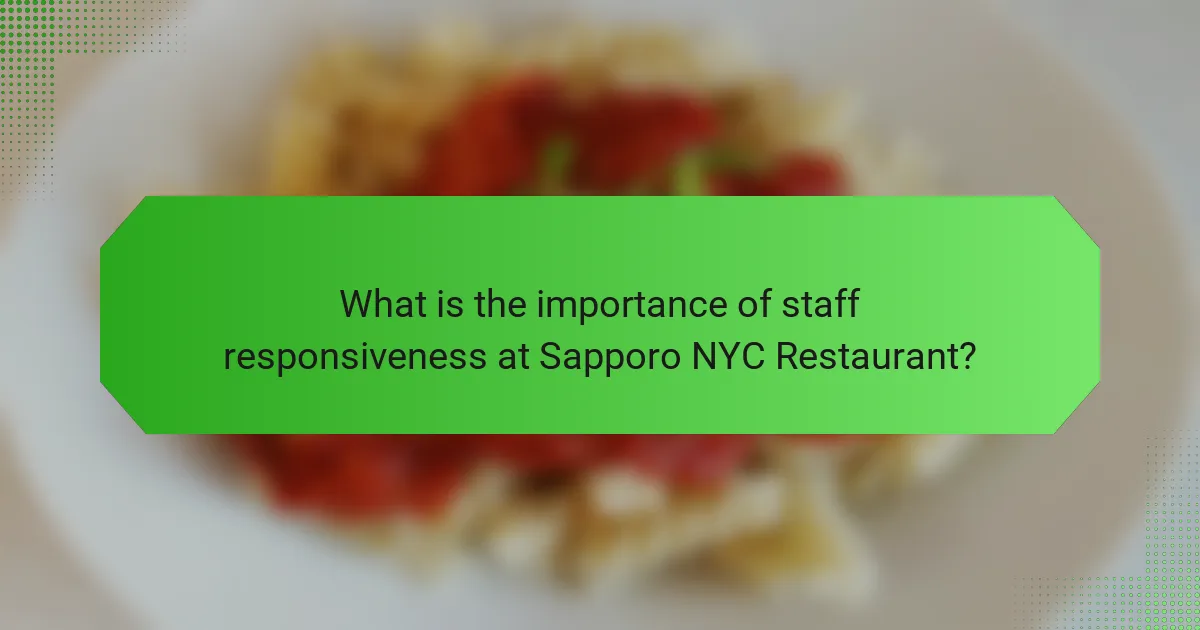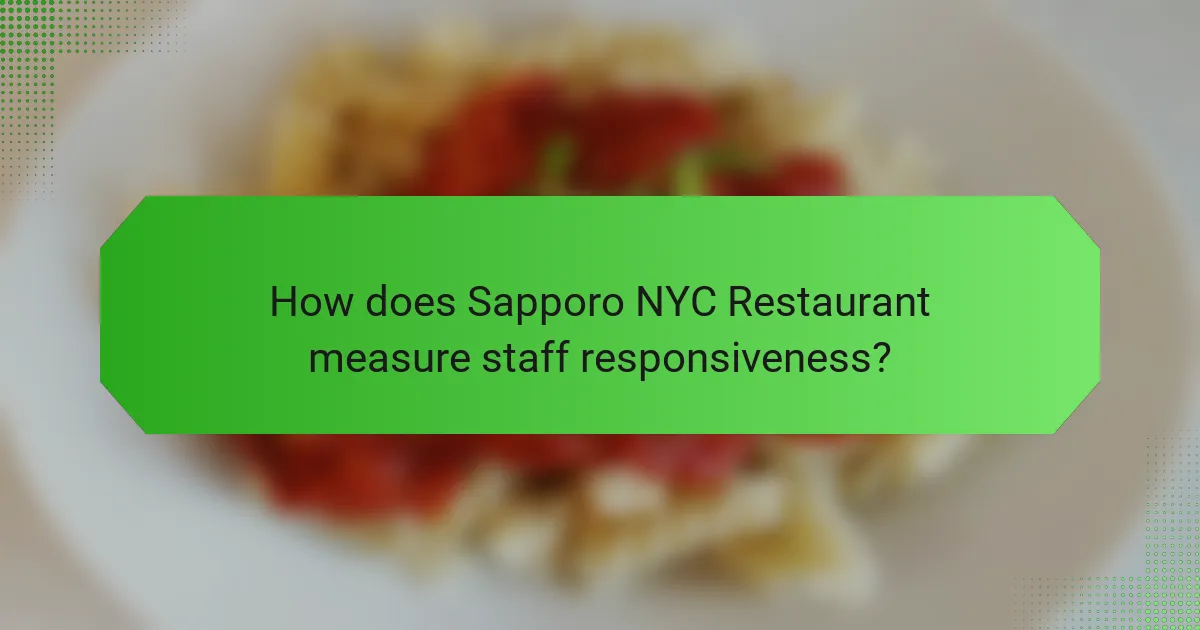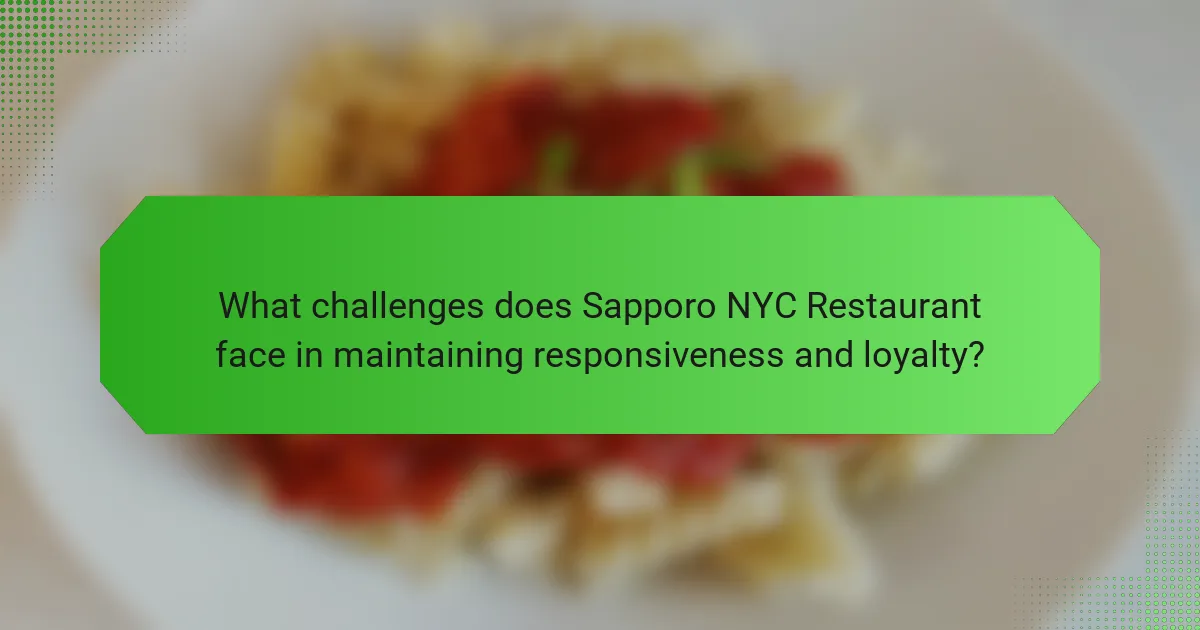
What is the importance of staff responsiveness at Sapporo NYC Restaurant?
Staff responsiveness at Sapporo NYC Restaurant is crucial for enhancing customer satisfaction. Quick and attentive service leads to a positive dining experience. Customers feel valued when staff promptly address their needs. This responsiveness fosters loyalty and encourages repeat visits. Studies show that restaurants with high staff responsiveness see increased customer retention rates. For instance, a survey by the National Restaurant Association found that 70% of diners return to establishments where they received excellent service. Therefore, effective staff responsiveness directly impacts the restaurant’s success and reputation.
How does staff responsiveness impact customer experience?
Staff responsiveness significantly enhances customer experience. Quick and attentive responses from staff create a positive atmosphere. Customers feel valued and appreciated when their needs are met promptly. This can lead to increased customer satisfaction and loyalty. Research indicates that 70% of customers value staff responsiveness as a key aspect of their dining experience. Moreover, responsive staff can effectively resolve issues, reducing negative experiences. A study by the Harvard Business Review found that timely service can increase customer retention by 5-10%. Overall, staff responsiveness is crucial in shaping a favorable customer experience in restaurants.
What specific aspects of service contribute to perceived responsiveness?
Specific aspects of service that contribute to perceived responsiveness include staff attentiveness, promptness in service, and effective communication. Staff attentiveness involves actively observing and addressing customer needs. Promptness in service refers to the speed at which staff respond to requests and deliver food or drinks. Effective communication includes clear and friendly interactions, ensuring customers feel acknowledged. Research shows that these elements significantly enhance customer satisfaction and loyalty. A study by Parasuraman et al. (1988) highlights that responsiveness is a key dimension of service quality.
How do customers evaluate staff responsiveness?
Customers evaluate staff responsiveness through various criteria. They consider the speed of service, which reflects how quickly staff attend to requests. They also assess the quality of communication, including clarity and friendliness. Additionally, customers note the staff’s ability to resolve issues effectively. Surveys indicate that 70% of customers value prompt responses highly. In the restaurant industry, a study found that responsive staff can increase customer satisfaction by 30%. These factors collectively influence customers’ perceptions of overall service quality.
Why is customer loyalty significant for Sapporo NYC Restaurant?
Customer loyalty is significant for Sapporo NYC Restaurant because it drives repeat business and enhances profitability. Loyal customers tend to spend more and visit more frequently. According to research by Bain & Company, increasing customer retention rates by just 5% can increase profits by 25% to 95%. Additionally, loyal customers often act as brand advocates, referring new customers through word-of-mouth. This organic marketing reduces customer acquisition costs. Furthermore, strong customer loyalty fosters a sense of community around the restaurant, enhancing its reputation. Overall, customer loyalty is a critical factor in the long-term success of Sapporo NYC Restaurant.
What factors contribute to building customer loyalty in restaurants?
Key factors contributing to building customer loyalty in restaurants include exceptional service, quality food, and a welcoming atmosphere. Exceptional service fosters positive experiences, leading to repeat visits. Quality food ensures customer satisfaction, encouraging patrons to return. A welcoming atmosphere creates comfort, making customers feel valued. Consistent positive interactions strengthen emotional connections with the restaurant. Loyalty programs can incentivize repeat business, rewarding customers for their patronage. According to a study by the National Restaurant Association, 83% of customers are more likely to return if they receive great service. These elements combined significantly enhance customer loyalty in the restaurant industry.
How does customer loyalty affect restaurant profitability?
Customer loyalty significantly boosts restaurant profitability. Loyal customers tend to visit more frequently, increasing overall sales. They also spend more per visit compared to new customers. According to a study by the Harvard Business Review, increasing customer retention by just 5% can lead to a profit increase of 25% to 95%. Additionally, loyal customers often refer others, reducing marketing costs. This word-of-mouth promotion is invaluable for attracting new patrons. Overall, fostering customer loyalty creates a sustainable competitive advantage for restaurants.

How does Sapporo NYC Restaurant measure staff responsiveness?
Sapporo NYC Restaurant measures staff responsiveness through customer feedback and observation. They utilize comment cards and online surveys to gather insights from diners. Staff performance is also monitored during service shifts by management. Regular training sessions reinforce the importance of quick and effective customer interaction. Additionally, they analyze response times to customer requests as a key performance indicator. This systematic approach ensures that staff responsiveness aligns with customer expectations.
What metrics are used to assess staff performance?
Common metrics used to assess staff performance include customer feedback, sales performance, and attendance records. Customer feedback is often gathered through surveys and reviews, providing insights into service quality. Sales performance metrics track individual contributions to revenue, reflecting effectiveness in upselling and overall productivity. Attendance records indicate reliability and commitment to scheduled shifts. These metrics collectively help evaluate staff effectiveness and areas for improvement.
How do customer feedback and reviews influence staff assessments?
Customer feedback and reviews significantly influence staff assessments by providing measurable insights into employee performance. Positive feedback often highlights effective service, leading to favorable evaluations. Conversely, negative reviews can pinpoint areas where staff may need improvement. This feedback loop helps management make informed decisions regarding promotions and training needs. A study by the Harvard Business Review indicates that businesses that actively incorporate customer feedback see a 10-15% increase in employee performance. Therefore, leveraging customer reviews is crucial for accurate staff assessments.
What role does training play in improving staff responsiveness?
Training enhances staff responsiveness by equipping employees with essential skills and knowledge. It fosters a deeper understanding of customer needs and expectations. Effective training programs focus on communication, problem-solving, and service techniques. According to a study by the American Society for Training and Development, companies that invest in employee training see a 24% increase in productivity. This increase translates to faster response times and improved customer interactions. Consequently, well-trained staff contribute to higher customer satisfaction and loyalty.
What strategies does Sapporo NYC Restaurant implement to enhance customer loyalty?
Sapporo NYC Restaurant enhances customer loyalty through personalized service and loyalty programs. The restaurant trains staff to provide attentive and responsive service. This approach creates a welcoming atmosphere for guests. Sapporo also offers a loyalty rewards program that incentivizes repeat visits. Customers earn points for each purchase, which can be redeemed for discounts or free items. Additionally, Sapporo engages customers through regular feedback surveys. This helps the restaurant understand customer preferences and improve offerings. By implementing these strategies, Sapporo NYC Restaurant fosters a loyal customer base.
How do loyalty programs affect customer retention?
Loyalty programs significantly enhance customer retention by incentivizing repeat purchases. These programs reward customers with points, discounts, or exclusive offers for their continued patronage. According to a study by Bond Brand Loyalty, 79% of consumers are more likely to continue doing business with brands that have a loyalty program. Furthermore, customers enrolled in loyalty programs tend to spend 12-18% more than non-members. This increased spending is often attributed to the perceived value of rewards and benefits. By fostering a sense of belonging and appreciation, loyalty programs create stronger emotional connections between customers and brands.
What role does personalized service play in fostering loyalty?
Personalized service plays a crucial role in fostering customer loyalty. It creates a unique connection between the staff and customers. When customers feel recognized and valued, they are more likely to return. Personalized interactions can include remembering a customer’s name or their favorite dish. Research indicates that 70% of consumers are more likely to stay loyal to a brand that personalizes experiences. This connection enhances customer satisfaction and encourages repeat visits. In a restaurant setting, responsive staff who provide tailored service can significantly boost loyalty.

What challenges does Sapporo NYC Restaurant face in maintaining responsiveness and loyalty?
Sapporo NYC Restaurant faces challenges in maintaining responsiveness and loyalty primarily due to high competition. The restaurant industry in NYC is saturated with numerous dining options. This saturation makes it difficult for Sapporo to stand out. Additionally, staff turnover can disrupt service consistency. Frequent changes in staff affect customer relationships. Limited resources can also hinder effective customer engagement strategies. Moreover, feedback management is crucial but often neglected. Inconsistent responses to customer inquiries can lead to dissatisfaction. These factors collectively impact customer loyalty and responsiveness.
How do staffing issues impact service quality?
Staffing issues negatively impact service quality. Insufficient staff leads to longer wait times for customers. This can result in decreased customer satisfaction. Overworked employees may provide lower quality service. High turnover rates can disrupt service consistency. Inadequate training due to staffing shortages can result in mistakes. Research shows that 70% of customers cite service quality as a key factor in their dining experience. Therefore, addressing staffing issues is crucial for maintaining high service standards.
What are common barriers to effective communication between staff and customers?
Common barriers to effective communication between staff and customers include language differences, unclear messaging, and lack of active listening. Language differences can lead to misunderstandings and frustration. Unclear messaging from staff can confuse customers about menu items or services. Lack of active listening by staff can result in missed customer needs or concerns. Research indicates that 70% of customer complaints stem from poor communication. Effective communication is essential for enhancing customer satisfaction and loyalty.
What best practices can Sapporo NYC Restaurant adopt to improve staff responsiveness and customer loyalty?
Sapporo NYC Restaurant can improve staff responsiveness and customer loyalty by implementing effective training programs. Regular training sessions enhance staff skills and knowledge. Empowering employees to make decisions can lead to quicker service. Utilizing technology, such as mobile ordering systems, can streamline operations. Encouraging feedback from customers helps identify areas for improvement. Recognizing and rewarding staff for excellent service fosters a positive work environment. Building a strong community presence can enhance customer relationships. Establishing a loyalty program incentivizes repeat visits and strengthens customer ties.
How can regular training sessions enhance staff skills?
Regular training sessions enhance staff skills by providing consistent opportunities for learning and development. These sessions improve knowledge of menu items, service protocols, and customer interaction techniques. Staff becomes more proficient in handling various customer requests and issues. Enhanced skills lead to increased efficiency in service delivery. According to a study by the National Center on the Educational Quality of the Workforce, companies that invest in training see a 24% increase in productivity. This productivity boost translates to improved customer experiences. Satisfied customers are more likely to return and recommend the restaurant. Thus, regular training directly impacts staff performance and customer loyalty.
What strategies can be implemented to gather and act on customer feedback?
Implementing strategies to gather and act on customer feedback includes utilizing surveys, direct communication, and social media engagement. Surveys can be conducted via email or in-person after dining experiences. Direct communication involves staff asking customers about their experiences during or after meals. Social media engagement allows customers to share feedback publicly, which can be monitored for insights.
According to a 2020 study by the Harvard Business Review, companies that actively seek customer feedback see a 10% increase in customer satisfaction. Additionally, responding to feedback can improve customer loyalty, as 70% of customers feel valued when their opinions are acknowledged. These strategies create a loop of continuous improvement and enhance customer relationships.
Sapporo NYC Restaurant serves as the primary entity in this article, which explores the critical role of staff responsiveness in enhancing customer loyalty and satisfaction. The content outlines how quick and attentive service fosters positive dining experiences, leading to increased customer retention rates. It discusses specific aspects of service that contribute to perceived responsiveness, methods for measuring staff performance, and the impact of customer loyalty on profitability. Additionally, the article addresses challenges faced in maintaining responsiveness and loyalty, along with best practices to improve staff performance and customer engagement.


